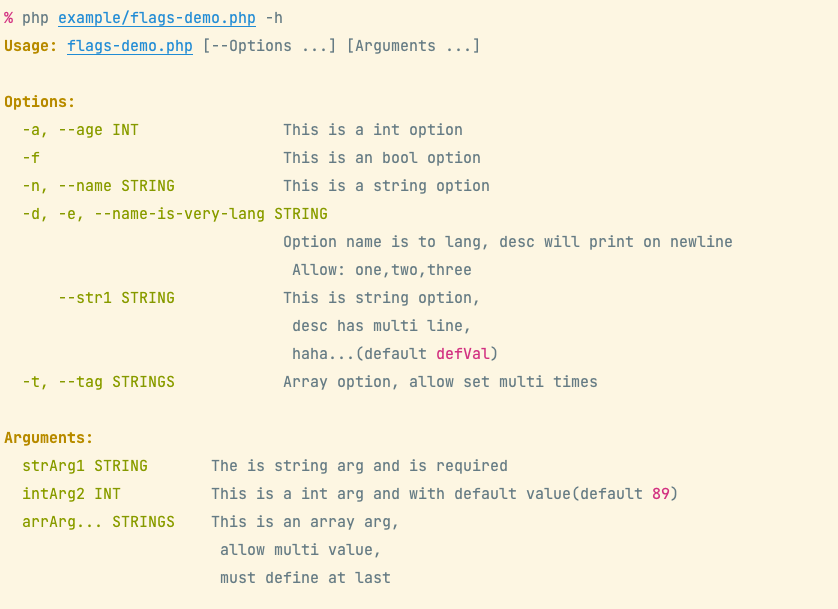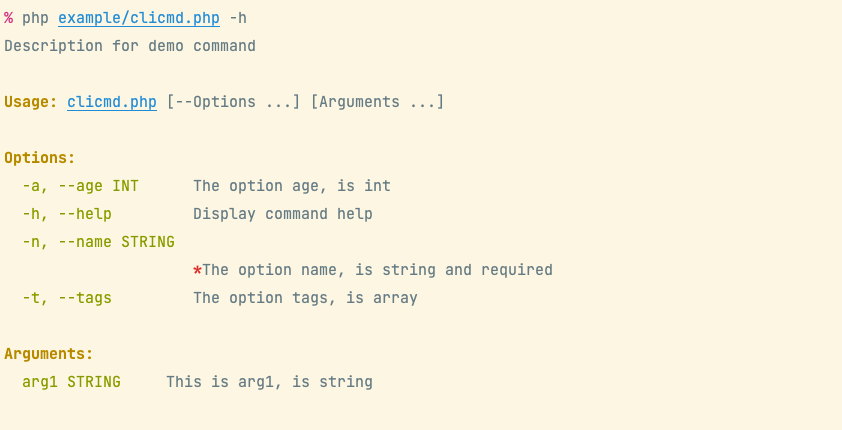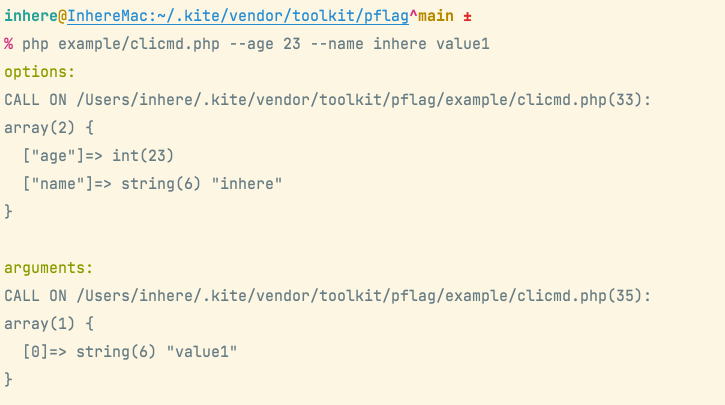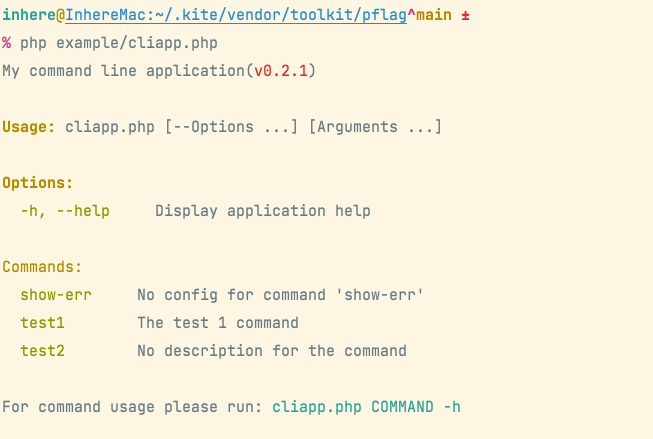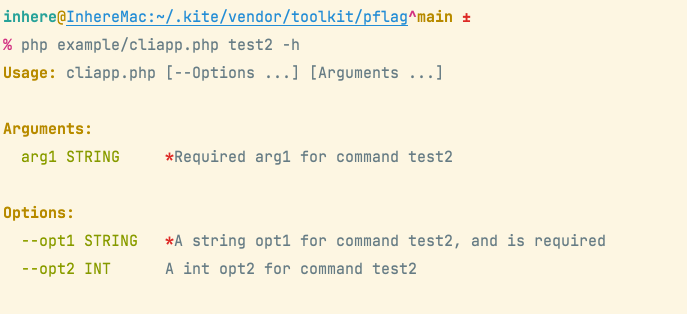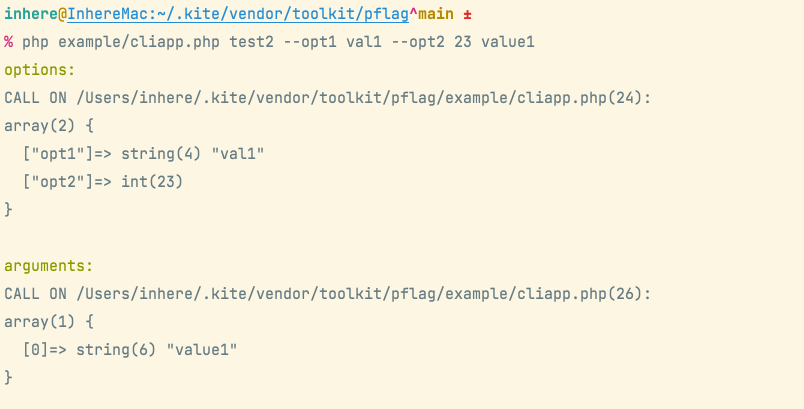toolkit / pflag
Command line flag parse library of the php
Installs: 37 873
Dependents: 5
Suggesters: 1
Security: 0
Stars: 34
Watchers: 1
Forks: 0
Open Issues: 1
pkg:composer/toolkit/pflag
Requires
- php: >8.0.0
- ext-mbstring: *
- toolkit/cli-utils: ~2.0
- toolkit/stdlib: ~2.0
README
Generic PHP command line flags parse library
Github: php-toolkit/pflag
Features
- Generic command line options and arguments parser.
- Support set value data type(
int,string,bool,array), will auto format input value. - Support set multi alias names for an option.
- Support set multi short names for an option.
- Support set default value for option/argument.
- Support read flag value from ENV var.
- Support set option/argument is required.
- Support set validator for check input value.
- Support auto render beautiful help message.
Flag Options:
- Options start with
-or--, and the first character must be a letter - Support long option. eg:
--long--long value - Support short option. eg:
-s -a value - Support define array option
- eg:
--tag php --tag gowill gettag: [php, go]
- eg:
Flag Arguments:
- Support binding named arguemnt
- Support define array argument
Quick build command
- Use
Toolkit\PFlag\CliCmdto quickly build a simple command application - Use
Toolkit\PFlag\CliAppto quickly build a command application that supports subcommands
Install
- Require PHP 8.0+
composer
composer require toolkit/pflag
Flags Usage
Flags - is an cli flags(options&argument) parser and manager.
example codes please see example/flags-demo.php
Create Flags
use Toolkit\PFlag\Flags; require dirname(__DIR__) . '/test/bootstrap.php'; $flags = $_SERVER['argv']; // NOTICE: must shift first element. $scriptFile = array_shift($flags); $fs = Flags::new(); // can with some config $fs->setScriptFile($scriptFile); /** @see Flags::$settings */ $fs->setSettings([ 'descNlOnOptLen' => 26 ]); // ...
Define options
Examples for add flag option define:
use Toolkit\PFlag\Flag\Option; use Toolkit\PFlag\FlagType; use Toolkit\PFlag\Validator\EnumValidator; // add options // - quick add $fs->addOpt('age', 'a', 'this is a int option', FlagType::INT); // - use string rule $fs->addOptByRule('name,n', 'string;this is a string option;true'); // - use array rule /** @see Flags::DEFINE_ITEM for array rule */ $fs->addOptByRule('name-is-very-lang', [ 'type' => FlagType::STRING, 'desc' => 'option name is to lang, desc will print on newline', 'shorts' => ['d','e','f'], // TIP: add validator limit input value. 'validator' => EnumValidator::new(['one', 'two', 'three']), ]); // -- add multi option at once. $fs->addOptsByRules([ 'tag,t' => 'strings;array option, allow set multi times', 'f' => 'bool;this is an bool option', ]); // - use Option $opt = Option::new('str1', "this is string option, \ndesc has multi line, \nhaha..."); $opt->setDefault('defVal'); $fs->addOption($opt);
Define Arguments
Examples for add flag argument define:
use Toolkit\PFlag\Flag\Argument; use Toolkit\PFlag\FlagType; // add arguments // - quick add $fs->addArg('strArg1', 'the is string arg and is required', 'string', true); // - use string rule $fs->addArgByRule('intArg2', 'int;this is a int arg and with default value;no;89'); // - use Argument object $arg = Argument::new('arrArg'); // OR $arg->setType(FlagType::ARRAY); $arg->setType(FlagType::STRINGS); $arg->setDesc("this is an array arg,\n allow multi value,\n must define at last"); $fs->addArgument($arg);
Parse Input
use Toolkit\PFlag\Flags; use Toolkit\PFlag\FlagType; // ... if (!$fs->parse($flags)) { // on render help return; } vdump($fs->getOpts(), $fs->getArgs());
Show help
$ php example/flags-demo.php --help
Output:
Run demo:
$ php example/flags-demo.php --name inhere --age 99 --tag go -t php -t java -d one -f arg0 80 arr0 arr1
Output:
# options
array(6) {
["str1"]=> string(6) "defVal"
["name"]=> string(6) "inhere"
["age"]=> int(99)
["tag"]=> array(3) {
[0]=> string(2) "go"
[1]=> string(3) "php"
[2]=> string(4) "java"
}
["name-is-very-lang"]=> string(3) "one"
["f"]=> bool(true)
}
# arguments
array(3) {
[0]=> string(4) "arg0"
[1]=> int(80)
[2]=> array(2) {
[0]=> string(4) "arr0"
[1]=> string(4) "arr1"
}
}
Get Value
Get flag value is very simple, use method getOpt(string $name) getArg($nameOrIndex).
TIP: Will auto format input value by define type.
Options
$force = $fs->getOpt('f'); // bool(true) $age = $fs->getOpt('age'); // int(99) $name = $fs->getOpt('name'); // string(inhere) $tags = $fs->getOpt('tags'); // array{"php", "go", "java"}
Arguments
$arg0 = $fs->getArg(0); // string(arg0) // get an array arg $arrArg = $fs->getArg(1); // array{"arr0", "arr1"} // get value by name $arrArg = $fs->getArg('arrArg'); // array{"arr0", "arr1"}
Build simple cli app
In the pflag, built in CliApp and CliCmd for quick create and run an simple console application.
Create simple alone command
Build and run a simple command handler. see example file example/clicmd.php
use Toolkit\Cli\Cli; use Toolkit\PFlag\CliCmd; use Toolkit\PFlag\FlagsParser; CliCmd::new() ->config(function (CliCmd $cmd) { $cmd->name = 'demo'; $cmd->desc = 'description for demo command'; // config flags $cmd->options = [ 'age, a' => 'int;the option age, is int', 'name, n' => 'the option name, is string and required;true', 'tags, t' => 'array;the option tags, is array', ]; // or use property // $cmd->arguments = [...]; }) ->withArguments([ 'arg1' => 'this is arg1, is string' ]) ->setHandler(function (FlagsParser $fs) { Cli::info('options:'); vdump($fs->getOpts()); Cli::info('arguments:'); vdump($fs->getArgs()); }) ->run();
Usage:
# show help php example/clicmd.php -h # run command php example/clicmd.php --age 23 --name inhere value1
- Display help:
- Run command:
Create an multi commands app
Create an multi commands application, run subcommand. see example file example/cliapp.php
use Toolkit\Cli\Cli; use Toolkit\PFlag\CliApp; use Toolkit\PFlag\FlagsParser; use Toolkit\PFlagTest\Cases\DemoCmdHandler; $app = new CliApp(); $app->add('test1', fn(FlagsParser $fs) => vdump($fs->getOpts()), [ 'desc' => 'the test 1 command', 'options' => [ 'opt1' => 'opt1 for command test1', 'opt2' => 'int;opt2 for command test1', ], ]); $app->add('test2', function (FlagsParser $fs) { Cli::info('options:'); vdump($fs->getOpts()); Cli::info('arguments:'); vdump($fs->getArgs()); }, [ // 'desc' => 'the test2 command', 'options' => [ 'opt1' => 'a string opt1 for command test2', 'opt2' => 'int;a int opt2 for command test2', ], 'arguments' => [ 'arg1' => 'required arg1 for command test2;true', ] ]); // fn - required php 7.4+ $app->add('show-err', fn() => throw new RuntimeException('test show exception')); $app->addHandler(DemoCmdHandler::class); $app->run();
Usage:
# show help php example/cliapp.php -h # run command php example/cliapp.php test2 --opt1 val1 --opt2 23 value1
- Display commands:
- Command help:
- Run command:
Flag rule
The options/arguments rules. Use rule can quick define an option or argument.
- string value is rule(
type;desc;required;default;shorts). - array is define item
SFlags::DEFINE_ITEM - supported type see
FlagType::*
use Toolkit\PFlag\FlagType; $rules = [ // v: only value, as name and use default type FlagType::STRING // k-v: key is name, value can be string|array 'long,s', // name => rule 'long,a,b' => 'int', // long is option name, a and b is shorts. 'f' => FlagType::BOOL, 'str1' => ['type' => 'int', 'desc' => 'an string option'], 'tags' => 'array', // can also: ints, strings 'name' => 'type;the description message;required;default', // with desc, default, required ]
For options
- option allow set shorts
TIP: name
long,a,b-longis the option name. remaininga,bis short names.
For arguments
- argument no alias/shorts
- array value only allow defined at last
Definition item
The const Flags::DEFINE_ITEM:
public const DEFINE_ITEM = [ 'name' => '', 'desc' => '', 'type' => FlagType::STRING, 'helpType' => '', // use for render help // 'index' => 0, // only for argument 'required' => false, 'default' => null, 'shorts' => [], // only for option // value validator 'validator' => null, // 'category' => null ];
Custom settings
Settings for parse
// -------------------- settings for parse option -------------------- /** * Stop parse option on found first argument. * * - Useful for support multi commands. eg: `top --opt ... sub --opt ...` * * @var bool */ protected $stopOnFistArg = true; /** * Skip on found undefined option. * * - FALSE will throw FlagException error. * - TRUE will skip it and collect as raw arg, then continue parse next. * * @var bool */ protected $skipOnUndefined = false; // -------------------- settings for parse argument -------------------- /** * Whether auto bind remaining args after option parsed * * @var bool */ protected $autoBindArgs = true; /** * Strict match args number. * if exist unbind args, will throw FlagException * * @var bool */ protected $strictMatchArgs = false;
Setting for render help
support some settings for render help
// -------------------- settings for built-in render help -------------------- /** * Auto render help on provide '-h', '--help' * * @var bool */ protected $autoRenderHelp = true; /** * Show flag data type on render help. * * if False: * * -o, --opt Option desc * * if True: * * -o, --opt STRING Option desc * * @var bool */ protected $showTypeOnHelp = true; /** * Will call it on before print help message * * @var callable */ private $beforePrintHelp;
- custom help message renderer
$fs->setHelpRenderer(function (\Toolkit\PFlag\FlagsParser $fs) { // render help messages });
Unit tests
phpunit --debug
test with coverage:
phpdbg -dauto_globals_jit=Off -qrr $(which phpunit) --coverage-text phpdbg -dauto_globals_jit=Off -qrr $(which phpunit) --coverage-clover ./test/clover.info # use xdebug phpunit --coverage-clover ./test/clover.info
Project use
Check out these projects, which use https://github.com/php-toolkit/pflag :
- inhere/console Full-featured php command line application library.
- kite Kite is a tool for help development.
- More, please see Packagist

